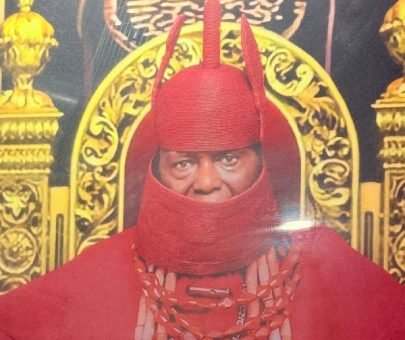
Royal Farewell: Ohworode of Olomu Kingdom Uhurhie-Osadjere II Passes On in Delta State

In a wave of mourning that swept across the Urhobo nation and echoed far beyond the borders of Delta State, Nigeria was plunged into a moment of solemn reflection following the death of His Royal Majesty, Uhurhie-Osadjere II, the revered Ohworode of Olomu Kingdom. The royal patriarch, known for his wisdom, longevity, and unshakable dedication to the cultural heritage of his people, has reportedly joined his ancestors, marking the end of an era in the annals of Urhobo history.
The announcement came like a thunderclap. Sources from The Nation Nigeria confirmed that the monarch, whose age-defying presence and spiritual command had long earned him the respect of both the traditional and modern spheres of society, passed on quietly, leaving behind a legacy few can equal. His death has sent shockwaves through the Olomu Kingdom and the broader Delta State, with traditional institutions, political leaders, and ordinary citizens pouring in tributes for a king whose life symbolized peace, cultural preservation, and unwavering service to his people.
Born into the royal lineage and ascending to the throne as the Ohworode—a revered title in the Urhobo traditional system—Uhurhie-Osadjere II brought with him not just the authority of the ancestors but a vision that seamlessly blended tradition with the demands of modern governance. His reign witnessed a renaissance of Olomu cultural identity, with festivals, traditional rites, and heritage monuments receiving heightened attention and revitalization. Under his leadership, the Olomu Kingdom became a beacon of peace and stability in a region often plagued by socio-political unrest.
What made his rule even more remarkable was not just its longevity but the vitality he retained even in his old age. His Royal Majesty was known to walk unaided, speak with clarity, and participate fully in traditional functions, well past the age most would consider the twilight years. He often stood as a symbol of strength and continuity, representing the resilience of the Urhobo spirit. Many community members frequently cited his ability to recall detailed histories and ancestral narratives with precision, making him a living archive of the kingdom’s past.
As news of his passing filtered through the kingdom, palace drummers fell silent, and the ceremonial cannon fire that usually accompanies joyous royal proclamations was replaced by the muted chants of traditional mourners. Women in black wrappers and white headscarves gathered at the palace square, weeping openly while men bowed their heads in deep respect, offering prayers to the ancestors to receive their noble son. The atmosphere was charged with emotion, as people grappled with the reality of losing a king who had come to define their very sense of identity.
Across social media platforms and mainstream outlets, condolence messages flooded in from around Nigeria and beyond. The Governor of Delta State expressed his deep sorrow and described Uhurhie-Osadjere II as “a monarch of impeccable dignity, whose leadership brought harmony and pride to the people of Olomu.” Other prominent figures, including senators, business moguls, and fellow royal fathers, echoed similar sentiments, emphasizing the pivotal role he played in championing the cause of traditional rulers and cultural values in contemporary Nigerian society.
His Royal Majesty’s influence was not limited to ceremonial duties. He was known to intervene in community disputes, champion youth empowerment, and engage actively with government on matters of development. Under his stewardship, Olomu Kingdom saw infrastructural growth and witnessed increased efforts to promote education among the younger generation. Many recall his passionate speeches during annual New Yam festivals, where he would implore the youth to honor their roots, respect their elders, and strive for excellence in all fields of life.
The death of the Ohworode also calls attention to the deep spiritual traditions of the Urhobo people. In line with custom, his transition to the ancestral realm will be followed by a period of elaborate rites, including sacred purification rituals, the sounding of royal gongs, and ancestral invocations by the highest-ranking traditional priests. These rituals, shrouded in layers of mystery and reverence, are meant to honor the departed king and ensure his peaceful journey into the realm of the ancestors.
Although the palace has yet to announce the official dates for these ceremonies, preparations are already underway, with traditional chiefs meeting behind closed doors to map out the succession process and mourning protocols. The Council of Chiefs, known as the Otota and the Owhovorio groups, are expected to guide the kingdom through this transition, preserving the dignity and sanctity of the throne until a new king is crowned.
His Royal Majesty Uhurhie-Osadjere II’s life story reads like a chronicle of loyalty and duty—loyalty to his ancestors, duty to his people. He was a father figure to many, a spiritual compass to the kingdom, and a bridge between generations. His ability to unify his people under a common purpose, his insistence on preserving sacred rites in the face of modernization, and his personal charisma earned him not just the loyalty of his subjects but the admiration of the world beyond.
As the kingdom mourns, there is also a rising awareness that with the departure of the Ohworode, an irreplaceable chapter in Urhobo history has closed. Yet, in his teachings, decisions, and legacy, he leaves behind a guidebook for leadership rooted in compassion, wisdom, and integrity. His presence will linger in the hearts of his people, etched into the collective memory of a community that had the privilege of being led by one of its finest sons.
As the sun sets over Olomu Kingdom, casting long shadows over the royal palace and the sacred groves that once echoed his prayers, a nation bows in reverence. Ohworode Uhurhie-Osadjere II has taken his final walk—a walk not of sorrow, but of honor, into the warm embrace of the ancestors. His spirit, they say, will now watch over the kingdom, guiding it with the same quiet strength that defined his earthly journey.


